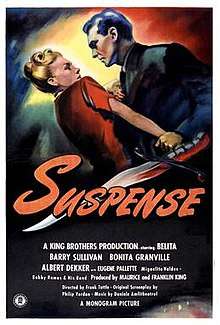Suspense (1946 film)
Suspense is a 1946 film noir directed by Frank Tuttle. The ice-skating-themed film stars Barry Sullivan and former Olympic skater Belita. It was also the last film appearance of actor Eugene Pallette. At a cost of 1.1 million dollars, it was considered the most expensive film put out by Monogram Pictures.[2][3]
 Theatrical release poster | |
| Directed by | Frank Tuttle |
|---|---|
| Produced by | Frank King Maurice King |
| Screenplay by | Philip Yordan |
| Story by | Philip Yordan |
| Starring | Barry Sullivan Belita Albert Dekker |
| Music by | Daniele Amfitheatrof |
| Cinematography | Karl Struss |
| Edited by | Richard V. Heermance Otho Lovering |
Production company | King Brothers Productions |
| Distributed by | Monogram Pictures |
Release date |
|
Running time | 101 minutes |
| Country | United States |
| Language | English |
| Budget | $870,000[1] |
Plot
Frank Leonard (Albert Dekker), the proprietor of an ice-skating revue, promotes a strong-arming peanut-vendor named Joe Morgan (Barry Sullivan) at the show to a management position based on suggestions he makes to improve the act of the show's star, Roberta Elva (Belita), who also happens to be the owner's wife.
However, he soon begins to notice that his new manager is paying more attention to his wife than he believes is appropriate, and begins to suspect that his new manager has designs not only on his wife but on his business. The plot thickens later when it appears that the man may have killed the owner.
Cast
- Belita as Roberta Leonard, aka Roberta Elva
- Barry Sullivan as Joe Morgan
- Bonita Granville as Ronnie
- Albert Dekker as Frank Leonard
- Eugene Pallette as Harry Wheeler
- George E. Stone as Max
- Edit Angold as Nora
- Leon Belasco as Pierre Yasha
Production
Morris King described the film as "a psychological treatment of Crime and Punishment."[4]
Reception
The film performed well at the box office.[5]
Critical response
When the film was first released, critic Bosley Crowther reviewed the film caustically, writing, "The Monogram people are so puffed up by the fact that their new film, Suspense, which came yesterday to the Victoria, is their first 'million-dollar release' that we wonder why some boastful genius didn't give it the title 'Expense.' At least, such a tag would betoken the little there is in this film and it wouldn't provoke expectation of something that isn't there. For, apart from some ice-skating numbers (which presumably coat all that coin), it has nothing to recommend it—let alone the thing of which the title speaks ... Frank Tuttle was the director from a script by Philip Yordan. Neither of their contributions is in the million-dollar class."[6]
More recently, film critic Dennis Schwartz, panned the film in his review, writing, "Monogram's most expensive film to date, produced by the King Brothers (Maurice and Frank) ... The heavy melodrama is suggestive of a nightmare. It is ruined by its leaden pace, lack of suspense, unpleasant characters, and unconvincing script. The film felt like a truck stuck on the ice, noisily moving back and forth to get some traction."[7]
References
- THOMAS F. BRADY Vandamm (Sep 8, 1946). "OUT HOLLYWOOD WAY: The Voice of the Turtle" MORE NEWS OUT OF HOLLYWOOD Coastscripts". New York Times. p. X1.
- Suspense on IMDb.
- THOMAS M. PRYOR (Mar 10, 1946). "BELITA, JILL OF ALL TRADES: Experiment Garlogs Girl Competition?". New York Times. p. X3.
- A.H. WEILER (June 3, 1945). "BY WAY OF REPORT: The King Brothers Hit the Film Jackpot --C. Bennett, Producer, Etc.--Addenda Bennett, Inc. The 'Spider's' Webb Close Shave". New York Times. p. X3.
- https://archive.org/stream/variety165-1947–01#page/n54/mode/1up
- Crowther, Bosley. The New York Times, film review, July 5, 1946. Accessed: July 13, 2013.
- Schwartz, Dennis. Ozus' World Movie Reviews, film review, March 24, 2002. Accessed: July 13, 2013.
External links
- Suspense on IMDb
- Suspense at AllMovie
- Suspense at the TCM Movie Database
- Suspense at the American Film Institute Catalog
- Suspense informational site and DVD review at DVD Beaver (includes images)
- Suspense film clip on YouTube
- Review of film at Variety'